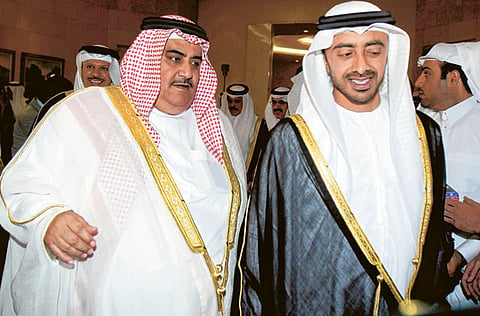Turkey steps in to calm region
Davutoglu to visit Bahrain as rhetoric between Gulf nations and Iran heats up

Manama: Ahmet Davutoglu, Turkey's foreign minister, is expected in Bahrain on Tuesday on a brief visit amidst growing tensions and aggressive rhetoric between the two shores of the Gulf.
No official statement about the purpose of the visit has been issued, but he is likely to engage in consultations over ways to appease the ominous situation in the region.
Ankara last month intensified contacts with several countries in the Gulf to help contain the crisis and advised all parties to refrain from steps that would escalate the tension.
According to Turkish media, Ankara is "deeply concerned over prospects of Sunni-Shiite tensions across the Middle East."
Abdul Hamid Bilici, a journalist with the Turkish daily Al Zaman, said that "Turkey is like a firefighter that is trying to extinguish the fire in the Middle East."
According to the journalist, Recep Tayyip Erdogan, the first Turkish prime minister to make a trip to Najaf, last week "visited Ayatollah Ali Al Sistani, the most powerful Shiite figure in Iraq, at his place and spoke with him for almost an hour."
"He probably thanked him for his efforts against sectarian conflict and asked that he be more sensitive to the threat spreading across the region," Bilici, who was among the accompanying journalists, wrote on Saturday.
In Kuwait City, a local daily said that Iran had plans to occupy islands in the Gulf and place some Gulf Cooperation Council (GCC) countries under a maritime siege using the pretext of protecting a segment of the population there.
"Iran's plot was to impose a new reality on the ground after taking over some islands in the Gulf and claiming that it has been urged by people in these countries to help them," Al Seyassah said in its lead article on Monday.
Special meeting
"However, the ploy was foiled after the GCC countries had a common stance and several countries and the European Union appreciated the situation," the daily said. According to the paper, the GCC countries are now working on limiting the number of Iranian expatriates, particularly those working in the food distribution sector.
Citing security sources it did not name, Al Seyassah said that the GCC countries believe that 2,000 people suspected of belonging to Iran's Revolutionary Guards have entered the countries illegally.
"The GCC foreign ministers agreed at their special meeting in Riyadh on Sunday evening to send a Gulf emissary, most likely the foreign minister of Qatar or the foreign minister of Oman, to Tehran to convey the GCC protest against the Iranian attitudes and blatant interference in GCC domestic issues," the daily said, quoting unidentified diplomatic sources.
The number of Iranian diplomats in the GCC, especially in Bahrain and Kuwait, could be reduced for security reasons, the sources said.
"The GCC foreign ministers also agreed to adopt a common stance and a common political language with and about Iran in all multilateral meetings. This includes, of course, the armament and nuclear issues that will be discussed at the next GCC summit," the source said.
Writing in Al Aan news portal yesterday, Nasser Al Mutairi, a Kuwaiti columnist, said that the GCC needed to have "a common stance towards Iran that goes beyond the routine protocol statements."
‘Broaden relations'
"We need measures that exclude, marginalise the role of Iran within the GCC and to reduce diplomatic representations. In fact, we need to deepen and broaden relations with Turkey so that we reinforce it as our ally and remove the Iranian influence. We need to replace Iran with Turkey which is widely accepted in the Gulf and Arab world," he wrote.



